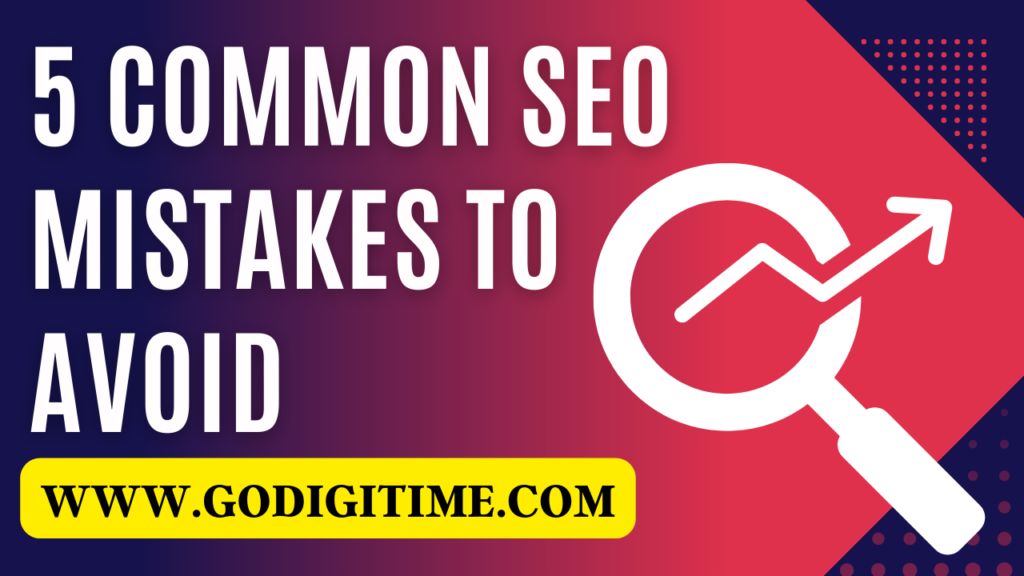
Introduction
Search Engine Optimization (SEO) is a main component of any website. It is the process of optimizing your website to increase website traffic and improve your website’s ranking on search engine results pages. However, many businesses make several SEO mistakes that harm their website’s performance and visibility. In this article, we will be discussing the five common SEO mistakes to avoid to improve your website’s visibility and drive more organic traffic.
Explanation of Why SEO is Important
Every day, millions of people search for products and services online. To ensure your website appears at the top of search engine results pages, SEO is essential. Optimizing your website’s content and structure to align with search engine algorithms increases your website’s visibility and drives more organic traffic. Without SEO, your website runs the risk of being buried under the vast number of websites available online.
Overview of the Article
This article aims to provide you with a comprehensive guide on the common SEO mistakes to avoid. It covers five critical SEO mistakes that businesses make and offers in-depth examinations of each mistake. We will also provide effective solutions and best practices to attain top rankings on search engine results pages.
Mistake 1: Not Conducting Keyword Research
Definition of Keyword Research
Keyword research is the process of identifying the right keywords or phrases that people use to search for products or services online.
Importance of Keyword Research
Keyword research lays a substantial foundation for any successful SEO strategy. It helps determine the demand for specific keywords and identifies the competition that already ranks for them.
How to Conduct Keyword Research
- Identify your industry’s primary keywords
- Determine the search volume of each keyword
- Analyze your competitor’s keywords
- Use keyword research tools like Google Keyword Planner, Ahrefs, and SEMRush.
Tools for Keyword Research
- Google Keyword Planner
- Ahrefs
- SEMRush
Mistake 2: Neglecting On-Page SEO
Definition of On-Page SEO
On-Page SEO is the practice of optimizing your website’s content, structure, and HTML code to align with search engine algorithms.
Importance of On-Page SEO
On-Page SEO is a vital component of any SEO strategy. It helps search engines understand what your website content is, and when done correctly, it significantly improves your website’s visibility and ranking.
Elements of On-Page SEO
- Conducting keyword research and incorporating them in your content
- Creating optimized meta tags
- Including header tags
- Improving website speed and mobile responsiveness
- Optimizing images and videos
- Developing high-quality and fresh content.
Best Practices for On-Page SEO
- Conduct keyword research and incorporate them into your content
- Develop quality and fresh content
- Optimize meta tags and header tags
- Focus on website speed and mobile responsiveness
- Use optimized images and videos
Mistake 3: Overlooking Technical SEO
Definition of Technical SEO
Technical SEO refers to the practice of optimizing your website’s technical aspects to improve its visibility and ranking on search engine results pages.
Importance of Technical SEO
Technical SEO can make or break your website’s ranking. Without ensuring your website’s technical aspects are optimized, your content may never appear on search engine results pages, no matter how well optimized it is.
Technical SEO Mistakes to Avoid
- Not Optimizing Robots.txt file
- Poor website structure and organization
- Slow loading websites
- Broken internal and external links
- Non-optimized URL structures
Technical SEO Best Practices
- Optimize your website structure
- Increase website speed
- Use HTTPS protocols
- Ensure the website’s mobile responsiveness
- Optimize robots.txt file
Mistake 4: Ignoring User Experience
Explanation of User Experience
User experience refers to the subjective opinion of users when they interact with your website. It includes the website’s design, speed, ease of use, etc.
Importance of User Experience
User experience is a critical factor that determines whether a visitor stays on your website or bounces. Search engines favor websites with high-quality user experience, and they tend to rank them higher.
Common User Experience Mistakes
- Non-responsive website design
- Complicated website navigation
- Slow-loading website speed
- Poor website layout
Tips for Improving User Experience
- Optimize website loading speed
- Implement responsive design
- Improve website navigation
- Simplify website layout
Mistake 5: Not Tracking Performance
Definition of SEO Performance Tracking
SEO performance tracking is the process of monitoring website metrics that help evaluate the website’s visibility and ranking on search engine results pages.
Importance of Performance Tracking
SEO performance tracking is vital as it helps to measure the effectiveness of your SEO strategy. It enables you to identify which optimizations work and which need tweaking.
Key Metrics to Monitor
- Organic Traffic
- Bounce Rate
- Time spent on the website
- Number of Organic Keywords
- Conversion Rate
Tools for Performance Tracking
- Google Analytics
- Ahrefs
- SEMRush
Conclusion
SEO is a valuable tool to drive organic traffic to your website. However, several common pitfalls can impact your website’s visibility and performance. With the right strategy, you can avoid these mistakes and improve your website’s SEO performance. By conducting thorough keyword research, implementing effective on-page SEO, perfecting technical SEO, optimizing user experience, and tracking performance, you can create a successful SEO strategy that drives traffic and elevates your website ranking.
Summary of the Article
SEO is a vital part of any successful website. To avoid common mistakes in SEO, businesses must conduct keyword research, implement on-page and technical SEO best practices, optimize user experience, and track website performance. With these best practices in place, businesses can improve their website’s visibility, ranking and ultimately drive more organic traffic.
FAQs
What is SEO?
Search Engine Optimization (SEO) is a technique of optimizing your website and Blog content, Images, and Data to increase website traffic and improve your website ranking on search engines.
How important is SEO?
SEO is a crucial factor in driving organic traffic to your website and improving your website’s online visibility. It helps gain a higher ranking on search engine results pages and subsequently drives more traffic to your website.
What are the most common SEO mistakes?
The common SEO mistakes include not conducting keyword research, neglecting on-page SEO, overlooking technical SEO, ignoring user experience, and not tracking performance.
What is the best term for SEO?
The best term for SEO includes conducting thorough keyword research, implementing effective on-page SEO, perfecting technical SEO, optimizing user experience, and tracking website performance.
What are the tools for keyword research, on-page SEO, and performance tracking?
Keyword research tools include Google Keyword Planner, Ahrefs, and SEMRush. On-page SEO tools include Google Search Console, Yoast SEO plugin, and Screaming Frog. Performance tracking tools include Google Analytics, Ahrefs, and SEMRush.
How can improve my website’s SEO?
To improve your website’s SEO, conduct thorough keyword research, implement effective on-page and technical SEO best practices, optimize user experience, and track website performance.
